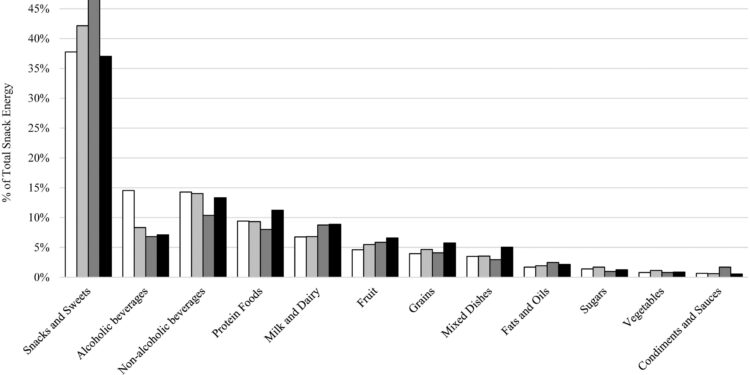Proportion of food sources of energy consumed during snacks according to levels of glycemic control. Credit: PLOS Global Public Health (2023). DOI: 10.1371/journal.pgph.0000802
Snacks account for nearly a quarter of daily calories among American adults and account for about a third of daily added sugar, a new study suggests.
Researchers analyzing survey data from more than 20,000 people found that Americans consumed an average of 400 to 500 calories per day in the form of snacks, often more than they consumed at breakfast, which offered little nutritional value.
Although dietitians are well aware of Americans’ propensity to snack, “the magnitude of the impact isn’t realized until you look at it,” said the study’s lead author, Christopher Taylor, professor of medical dietetics at the University of California School of Health and Rehabilitation Sciences. The Ohio State University.
“Snacks help make what we eat feel like a meal without it actually being a meal,” Taylor said. “You know what dinner will be: a protein, a side or two. But if you eat a meal consisting of what you eat as a snack, it becomes a completely different scenario, usually carbs, sugars, not a lot of protein, not much fruit, no vegetables, so it’s not a completely complete meal.
Survey participants who had their type 2 diabetes under control ate fewer sugary foods and snacked less overall than nondiabetic participants and those whose blood sugar levels indicated they were prediabetic.
“Diabetes education seems to be working, but we may need to give it back to people at risk for diabetes and even people with normal blood sugar levels to start improving their eating behaviors before people develop chronic disease,” Taylor said.
The study was recently published in PLOS Global Public Health.
The researchers analyzed data from 23,708 American adults over the age of 30 who participated from 2005 to 2016 in the National Health and Nutrition Examination Survey. The survey collects 24-hour dietary recalls from each participant, detailing not only what, but also when, all foods were consumed.
Respondents were categorized based on their HbA1c levels, a measure of blood sugar control, into four groups: nondiabetics, prediabetics, controlled diabetes, and poorly controlled diabetes.
Among the entire survey sample, snacks accounted for between 19.5% and 22.4% of total energy intake, while contributing very little to nutritional quality.
In descending order of proportion, snacks consisted of ready-made foods high in carbohydrates and fats, sweets, alcoholic beverages, non-alcoholic beverages including sugary drinks, proteins, milk and dairy products, fruits, cereals and, far behind, vegetables.
Noting that capturing 24 hours of food consumption doesn’t necessarily reflect how people usually eat, “it gives us a really good look at a lot of people,” Taylor said. “And that can help us understand what’s going on, where the nutritional deficiencies might be and what education we can provide.”
The finding that people with diabetes had healthier snacking habits was an indicator that dietary education is beneficial for people with the disease. But it’s information that almost everyone can use, Taylor said, and it’s not just about cutting down on sugar and carbs.
“We need to move from a little less added sugar to healthier snacking habits,” he said. “We’ve come to demonize individual foods, but we need to look at the bigger picture. Removing added sugars won’t automatically improve vitamin C, vitamin D, phosphorus, and iron. What if we remove refined grains, we lose the nutrients that come with enrichment.
“When you take something out, you have to put something back, and substitution becomes just as important as deletion.”
So, rather than giving advice on what foods to snack on, Taylor’s focus is on analyzing a day’s total diet and whether snacks will meet our nutritional needs.
“Especially during the holidays, it’s all about the environment and what you have available, and planning accordingly. And it’s also about purchasing behavior: what do we have at home?” he said.
“We think about what we’re going to pack for lunch and cook for dinner. But we don’t plan that way for our snacks. So you’re at the mercy of what’s available in your environment.”
More information:
Kristen Heitman et al, Snacks contribute significantly to total food intakes among adults stratified by blood glucose in the United States, PLOS Global Public Health (2023). DOI: 10.1371/journal.pgph.0000802
Provided by Ohio State University
Quote: American adults consume the equivalent of a meal in calories each day in the form of snacks (December 15, 2023) retrieved December 15, 2023 from
This document is subject to copyright. Apart from fair use for private study or research purposes, no part may be reproduced without written permission. The content is provided for information only.



